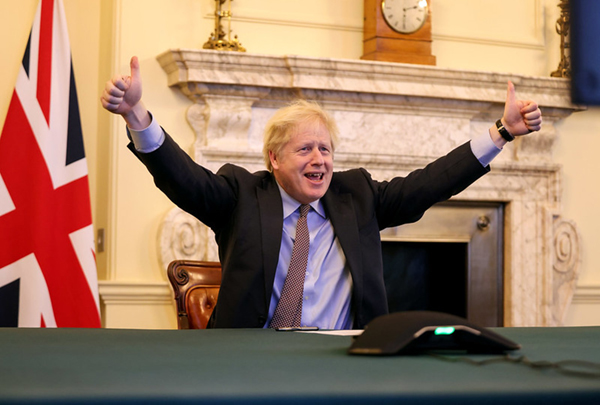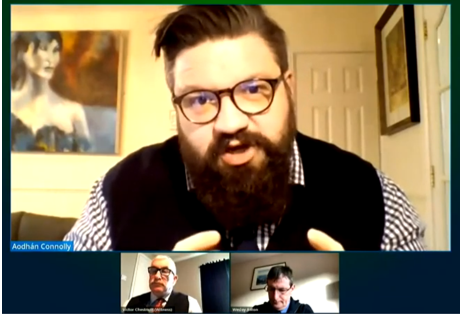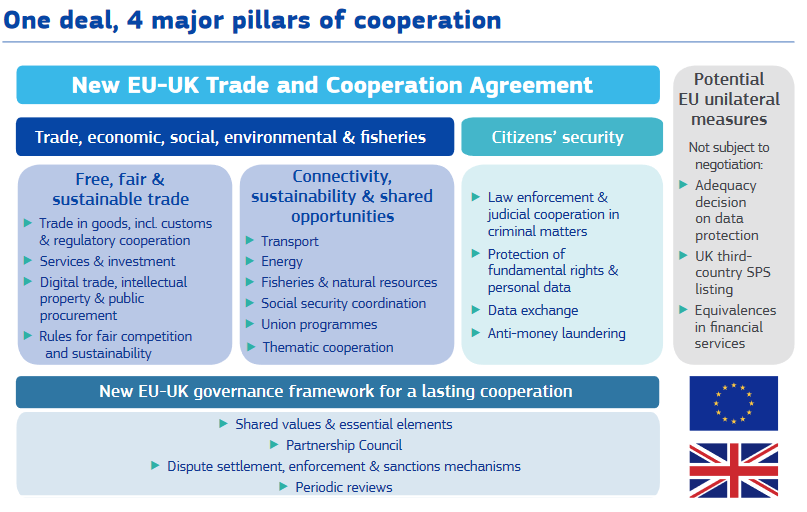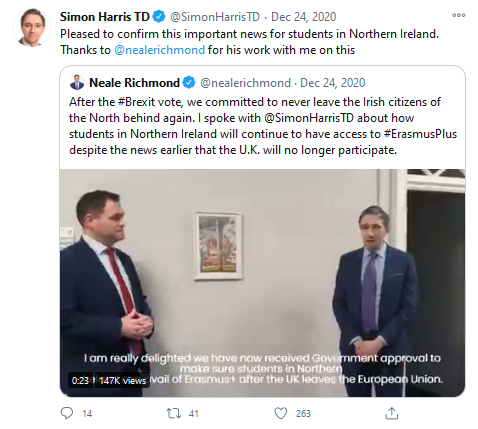Brexit Brief Newsletter
11 January 2021

Happy New Year! A deal has been agreed, provisionally ratified and the practical consequences are showing. We take a look at how the new trading arrangements – with NI under the Protocol and in the Single Market, while GB is outside – are impacting businesses and hauliers. This time of year is generally a quiet one and pre-Brexit stockpiling has lessened some traffic at ports as some companies ‘wait and see’ how proceedings are working out. Aside from trade, the EU-UK Trade and Cooperation Agreement has consequences for many other areas, including Northern Ireland’s security arrangements, participation in EU programmes, fisheries, and freedom of movement.
Just in time
The UK-EU Trade and Cooperation Agreement was finally agreed on Christmas Eve with just a week before the end of the transition period. The final hurdle was for Prime Minister Boris Johnson and European Commission President Ursula von der Leyen to find agreement on fisheries and future quotas for EU boats in UK waters.

Boris Johnson celebrates the deal. Source: Pippa Fowles/No 10 Downing Street
At Westminster, the European Union (Future Relationship) Bill, which gave the UK-EU agreement effect in UK law, received Royal Assent on 30 December 2020, at the end of just one day of debate. The UK Parliament passed the deal by 521 to 73 votes: alongside the Conservatives, Labour voted for the deal, arguing that the only alternative was no-deal. All other opposition parties voted against the deal, including the SDLP, Alliance, and the DUP.
The Scottish Parliament agreed not to consent to the Bill, endorsing a motion stating that it “would cause severe damage to Scotland’s environmental, economic and social interests”. The Parliament lamented that the UK Government has not followed the EU approach of provisional ratification, and as such the Bill received “severely limited scrutiny” in the UK Parliament. The Northern Ireland Assembly debated a motion brought by the Executive on the agreement on 30 December and agreed by 47 votes to 38 to an amended motion:
“That this Assembly takes note of the trade and cooperation agreement between the United Kingdom and the European Union; rejects Brexit, in line with the democratically expressed view of the people of Northern Ireland; notes that this deal will mean new barriers to trade and other negative consequences for Northern Ireland’s economy and society; and calls for the implementation of the protocol on Ireland/Northern Ireland, positive efforts to make arrangements work for all the people of Northern Ireland, and for this Assembly to decline legislative consent to the British Government to impose the European Union (Future Relationship) Bill, their inferior trade deal and their Brexit against the will of the people of Northern Ireland.”
The agreement is being applied on a provisional basis until 28 February 2021. This is to allow the European Parliament sufficient time to scrutinise the agreement.
Trade in goods
In the case of Northern Ireland –under the Protocol on Ireland/Northern Ireland, the region remains in the EU Single Market and applies the EU Customs Code - it was already understood that the end of the transition period would bring new barriers to trade between GB and NI. The question was: how much could a trade deal alleviate this friction?
Under the Protocol, customs formalities apply to goods moving between NI and GB. Sanitary and phytosanitary checks are required on agri-food, plant and animal products.
The clarifications agreed by the Joint Committee in December on the operation of the Protocol eased some concerns, even if only temporarily. The Committee agreed some flexibility on the implementation of the Protocol-related checks: certain chilled meat will be allowed to be imported by NI supermarket for six months, and for three months a restricted number of food suppliers for supermarkets can use simplified certificates for importing goods. During this period the UK will maintain its current EU SPS legislation. After this period, the bureaucratic burden on importers to NI from GB will increase as there is no mutual recognition of equivalence for SPS measures in the TCA.
The Committee’s decision on ‘at risk’ goods (i.e. those goods at risk of moving from the UK into the EU Single Market) meant that an estimated 98% of goods moving GB-NI would not be subject to tariffs. The zero quota/zero tariff deal on goods moving between the UK and EU means that the ‘at risk’ issue is much reduced (the risk that NI would be used as a ‘backdoor’ into the single market to avoid tariffs is much lower). It will now come into play, for example, when goods are imported into Northern Ireland from third countries. The complexities of the UK being an ‘independent trading nation’ outside the EU, having been part of a highly integrated supply chains between Europe, the UK, and the island of island, are becoming clearer.
Impact on business and trade
On 7 January, the Committee for Agriculture Environment and Rural Affairs heard evidence from business representatives who outlined the issues which have arisen in the first week under the operation of the Protocol. The witnesses also gave evidence to the House of Commons Northern Ireland Affairs Committee on 6 January.

Aodhán Connolly speaking to the AERA Committee Source: NI Assembly
Seamus Leheny of Logistics UK said that it hasn’t been plain sailing, which was inevitable, given that some guidance was only published on 31 December 2020. There has been a lack of awareness in some GB companies about the new procedures for importing into NI. He spoke of the heavy administration and time burden on companies and lack of expert advice available from support services in implementing the new requirements and paperwork.
AodhánConnolly, Director of the Northern Ireland Retail Consortium, said it was necessary for the EU and UK to sit down in early January, well ahead of end of the grace periods. Currently, we still do not know what the rules will be for parcels after 1 April. While there has been good engagement with Cabinet office and with DAERA, Connolly said there should be more formalised engagement with the Joint Committee Working Group.
Victor Chestnutt of the Ulster Farmers Union explained the implications of the trade deal for goods exported into Northern Ireland from third countries. Under the rebate system for tariffs, wheat and grain coming from Ukraine to NI would now be considered an 'at risk' good and would incur a tariff (£85/tonne). However, the rebate system for this is not yet set up. This could mean companies have to incur huge costs, with no guarantee of when the tariff would be reimbursed. He also explained to the Committee the issues for pedigree sector which transports live animals to the UK and the extensive checks and regulations in this area.
The Committee also heard from DAERA officials – the Department for Agriculture, Environment and Rural Affairs is responsible for implementing most of the changes and checks the new arrangements bring. Permanent Secretary Denis McMahon pointed out the unprecedented level of work and legislation which has been passed in preparation. He said the department has undertaken a ‘monumental’ programme of work and done everything in its power to complete this amid a global pandemic. He echoed the difficulties raised by the businesses, including the uncertainty of the negotiation process and short time period between the agreement and the changes. He noted that issues remain around transit via Dublin, groupage, preparation for the end of the three months’ grace period, and implementation of the full SPS regime.
The Chief Vet Robert Huey said that compliance with checks has increased in the course of the first period. He said his mandate had no flexibility legally, but operationally there is some: he is seeking to be pragmatic and sensible, and will enforce where it is appropriate. The objective is to keep the law and keep things flowing. Some problems can only be solved at political level, but some can be solved between technical officials.

EU summary on the scope of the deal. Source: European Commission
Services
UK qualifications will no longer be automatically recognised by the EU. Workers, such as doctors and architects, must have their qualifications recognised by member states according to the individual rules applicable to third country nationals. There is some scope within the TCA for the EU and UK to agree on further arrangements for mutual recognition of certain qualifications.
The Common Travel Area means that British citizens can work in Ireland and vice-versa. In a Memorandum of Understanding signed in 2019, the British and Irish Governments committed to ensuring mutual recognition of professional qualification in accordance with national law.
Another stumbling block for services provision could be on data sharing across borders: a six-month grace period has been provided by the agreement while the EU makes an adequacy decision on UK data protection.
Level Playing Field
For months, the ‘level playing field’ – fair and open competition - dominated the negotiations. Agreed in the deal are mechanisms for enforcement of these commitments, should either side ‘unilaterally distort’ the level playing field. This includes domestic implementation measures by courts and authorities, governance and dispute settlement mechanisms and unilateral remedial and rebalancing measures. This has potential implications for NI: if there were a dispute between the EU and UK, tariffs could potentially be imposed on certain UK goods which would mean tariffs would have to be paid on these imports into NI, but could be reimbursed later.
Security
Academics and policing officials had warned ahead of an agreement, when no deal seemed a possible outcome, that the downgrading of security cooperation could make their work slower and more cumbersome. The agreement covers cooperation on law enforcement and criminal justice, however, it will not replicate the benefits of the UK being an integrated member of the EU’s structured cross-border cooperation mechanisms. The blocs have agreed to establish a new framework for law enforcement and judicial cooperation in criminal matters.
The deal allows for UK cooperation with Europol and Eurojust as a third country partner. The deal states that “arrangements should be established” for fast exchange of DNA, fingerprints and vehicle registration, and access to EU PNR Passenger Name Records to prevent and detect serious crime. There are provisions for fast track extradition to replace the European Arrest Warrant (similar to arrangements between the EU and Iceland, and Norway) however more conditions are attached to requests for extradition, which can be refused by EU member states under some circumstances.
The UK has left the Schengen Information System – SIS II - which is the main database EU countries use to share real-time alerts on security and border management. It was used by UK officials over 600 million times a year.
Healthcare
UK citizens will continue to be able to access necessary and emergency state healthcare on temporary stays abroad in the EU. European Health Insurance Cards can continue to be used until expiration. If you apply for a card now, you will receive a UK Global Health Insurance Card which will replace the EHIC scheme for UK citizens. Similarly, EU citizens travelling to the UK will still be able to use their EHICs.
The Irish Government had previously made provisions so Northern Irish residents could continue to benefit from the European Health Insurance scheme: their medical expenses would be reimbursed by the Irish Government.
Erasmus and EU programmes
The UK Government decided to no longer participate in the Erasmus+ programme – Boris Johnson called the scheme “extremely expensive”. He intends to replace the Erasmus scheme with an alternative programme, the ‘Turing programme’, named after mathematician Alan Turing.
The Irish Government has committed to put in place arrangements so that students in NI universities and educational institutions will continue to have access to the Erasmus scheme. Students will have to register with an Irish higher education institution temporarily in order to take part, and will be funded by the Irish Government. This provision applies regardless of whether the NI citizen holds an Irish passport.

Simon Harris TD on Twitter @SimonHarrisTD
The UK will continue to participate in Horizon Europe, the EU’s research and innovation programme. Almost 300 projects from Northern Ireland have participated in the programme. The UK will also continue its participation in the EU satellite system Copernicus.
Freedom of movement
New immigration and travel rules now apply to UK citizens travelling to the EU (except Ireland which is covered by the Common Travel Area) and EU citizens travelling to the UK. Those born in Northern Ireland have a right to claim Irish citizenship, as per the Good Friday Agreement, and those who choose or have chosen to avail of this will be able to continue to exercise many EU rights such as free movement to live and work in EU and EEA member states.
For NI citizens who travel on British passports, they will need to follow the new rules: they should have six months left on their passports, and visits to the EEA countries over 90 days in any 180-day period would require a visa.
EU citizens living in Northern Ireland by 31 December 2020 need to apply to the EU Settlement Scheme to continue living here. This does not apply to Irish citizens in Northern Ireland. EU citizens who arrive after 1 January may need a visa. The agreement “allows the UK to determine whether short-term visits from the EU should be subject to visa requirements”.
This Week at the Assembly
- Wednesday 13 January, 9:30 am - Committee for Infrastructure - Secondary Legislation relating to EU Exit (Public Service Obligations in Transport)
- Wednesday 13 January, 9:30 am - Committee for Economy - EU Exit Secondary Legislation
- Wednesday 13 January, 2pm - Committee for the Executive Office - Oral Briefing from First Minister and deputy First Minister; Oral evidence from Departmental Officials on Assessment of the impact of Brexit on the institutions and North/South and East/West relationships, Brexit - Update on Common Frameworks
- Thursday 14 January, 10am - Committee for Agriculture, Environment and Rural Affairs - EU Transition and Priorities for 2021; Common Framework on Waste; Agricultural policy developments - UK, Ireland and other selected jurisdictions; EU Exit legislation - Oral Evidence from DAERA, Briefing from RaISe



